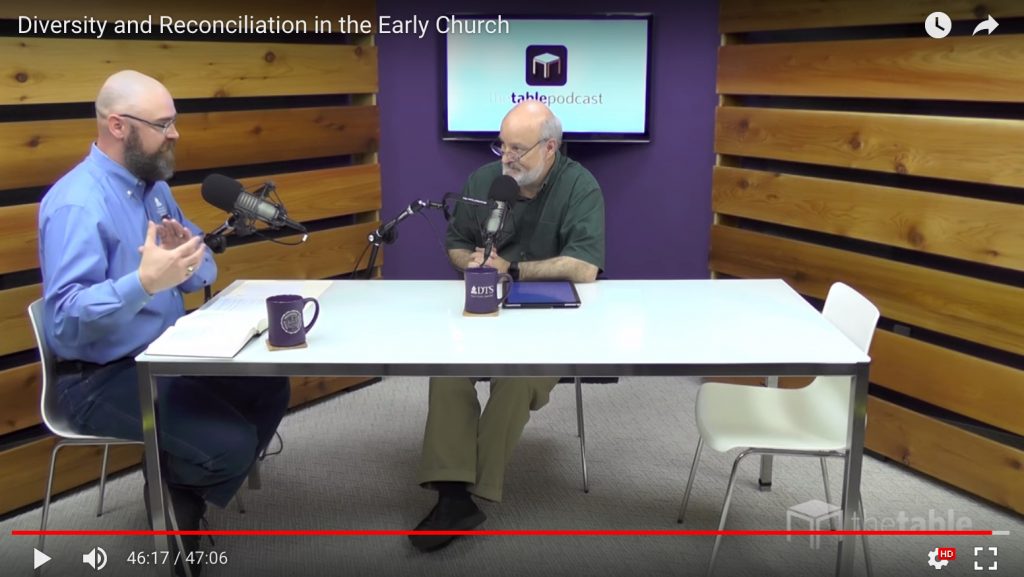
The Lausanne Movement and Operation World join forces to mobilise prayer globally
August 21, 2017
Leading and Managing People in the Church
September 14, 2017Diversity and Reconciliation in the Early Church

In this podcast, Drs. Darrell L. Bock and Michael Burer dialogue about the tensions of diversity and racial reconciliation in the age of the early church, focusing in on the very issues touched on in Paul’s letters.
To listen to the podcast and read transcript in its entirety, click here.

Excerpt from transcript below.
Darrell Bock: Welcome to the Table, where we discuss issues of God and culture. Our topic, today, is reconciliation and diversity in the New Testament. We want to take a look at how the church was originally formed out of Jew and gentile, and to take a look at the background of that, my guest, today, is Michael Burer, a distinguished colleague and New Testament associate professor.Michael BurerOh, thanks for that vote of confidence, Darrell – I appreciate that.
Darrell Bock: Good – you’re very, very welcome. Mike and I have worked together a long time, and I still trust him, so that’s good.Michael BurerWell, I was gonna say, we’ve started to look more alike as time has gone on, as well.Darrell BockExactly right, but, you know, your sense of exaggeration is overwhelming me.Michael BurerYeah, I realize that – I’m trying to compensate for something with this big beard and mustache.Darrell BockWell, Mike, talk a little bit about how you got into New Testament studies, and particularly your interest in Galatians and the New Testament.Michael BurerSure, I, much like a lot of ThM students, came here to get a good Bible education, and when I came here, I really fell in love with the New Testament, just with the language issues of grammar, things like that, but also the wider world. And the things that you taught me,
Darrell Bock: Well, Mike, talk a little bit about how you got into New Testament studies, and particularly your interest in Galatians and the New Testament.Michael BurerSure, I, much like a lot of ThM students, came here to get a good Bible education, and when I came here, I really fell in love with the New Testament, just with the language issues of grammar, things like that, but also the wider world. And the things that you taught me,
Michael Burer: Oh, thanks for that vote of confidence, Darrell – I appreciate that.
Darrell Bock: Good – you’re very, very welcome. Mike and I have worked together a long time, and I still trust him, so that’s good.
Michael Burer: Well, I was gonna say, we’ve started to look more alike as time has gone on, as well.Darrell BockExactly right, but, you know, your sense of exaggeration is overwhelming me.
Michael Burer: Yeah, I realize that – I’m trying to compensate for something with this big beard and mustache.
Darrell Bock: Well, Mike, talk a little bit about how you got into New Testament studies, and particularly your interest in Galatians and the New Testament.
Michael Burer: Sure, I, much like a lot of ThM students, came here to get a good Bible education, and when I came here, I really fell in love with the New Testament, just with the language issues of grammar, things like that, but also the wider world. And the things that you taught me, that other professors taught me, about understanding culture and things of that nature just really enriched everything I learned about the New Testament.
So, I got my Ph.D. in new Testament here, as well, and I’ve been teaching in the department for a number of years, now. And the more I do it, the more I realize, everything that we’re dealing with in the world around us, there are answers in the New Testament. There are cultural problems that they experienced, that we’re experiencing. So, in some ways, there’s nothing new under the sun, and God’s revelation is still valuable for us, today. So, happy to come and talk through a lot of these issues with you.
So, I got my Ph.D. in new Testament here, as well, and I’ve been teaching in the department for a number of years, now. And the more I do it, the more I realize, everything that we’re dealing with in the world around us, there are answers in the New Testament. There are cultural problems that they experienced, that we’re experiencing. So, in some ways, there’s nothing new under the sun, and God’s revelation is still valuable for us, today. So, happy to come and talk through a lot of these issues with you.
Darrell Bock: Well, that’s great to hear, and you’re preaching to the choir, here, so that’s good. Yeah, and we thought we would take a look at one of the more interesting themes that really resounds through the New Testament. And the way I like to introduce this topic is to say, there are very few passages where Paul takes the trouble to zero in on one word that summarizes what his ministry is about. And I say there are – and there maybe be more than this, but – there certainly are two very prominent passages where this is done. One is in Romans 1:16, where
And I say there are – and there maybe be more than this, but – there certainly are two very prominent passages where this is done. One is in Romans 1:16, where Paul, when he summarizes the reason he’s not ashamed of the Gospel, says that he’s not ashamed of the Gospel because it is the power of God unto salvation. So the word “power” is the one word that he picks to be the kind of summarizing zinger of what he’s all about. And power, there, means enablement, and we probably one day should come back and do a podcast just on that theme.
But the second passage where this idea comes up is in 2 Corinthians, Chapter 5, where Paul talks about being given a ministry of – and he has only one word to pick to summarize everything that he’s about – a ministry of reconciliation, as an ambassador of Christ. He’s just come off the passage where he says if anyone’s in Christ he’s a new creature, so, obviously talking about the Gospel. And the whole theme is summarized around the idea of reconciliation.
Peter does the same thing, in 1 Peter, Chapter 3, when he talks about being prepared to give a defense for the hope that is in us, and “hope” becomes his singular word to build things around. So we’ve got these passages that deal with these huge themes, and so, reconciliation is certainly one of those. In fact, in New Testament studies, there’s often a debate about what’s the most central concept in Pauline theology. And one of the concepts that certainly comes up for this discussion – at least as being a candidate, if not the candidate – is the theme of reconciliation.
Peter does the same thing, in 1 Peter, Chapter 3, when he talks about being prepared to give a defense for the hope that is in us, and “hope” becomes his singular word to build things around. So we’ve got these passages that deal with these huge themes, and so, reconciliation is certainly one of those. In fact, in New Testament studies, there’s often a debate about what’s the most central concept in Pauline theology. And one of the concepts that certainly comes up for this discussion – at least as being a candidate, if not the candidate – is the theme of reconciliation.
Michael Burer: Yeah, and, well, you had asked me, before, about my work in Galatians and writing a commentary on it. And Paul does the same thing, he invests two words with that theological significance. The first would be “justification,” and the second would be “inheritance.” And so, he, in that particular book, is using those terms, and like you said, we oftentimes debate if justification is the key of Pauline theme, or whatnot. But in terms of
But in terms of kind of dovetailing with reconciliation, it has a very human element to it, because both Jew and gentile receive both of those things equally. And so, I know we’ll talk more about those particular passages, but it’s amazing to see how Paul’s theological mind is working on our salvation from all these different angles, and they just all represent different facets of the beautiful salvation that we receive from the Lord.
Darrell Bock: That’s exactly right, and I think that sometimes we don’t appreciate the variety of ways kind of in to the story that one can take. Well, let’s talk a little bit about the background of this, ’cause we wanna look at the theme of reconciliation and talk about it. We wanna look at some passages very, very specifically, but first I wanna paint the backdrop. And so, to do that, I think we need to go back.
Well, we could go all the way back to Genesis 12, and the way in which God chooses Israel to be an important nation in the scheme of things for his plan, and yet he’s gonna bless the world through them. But we’ll move forward and talk about the period between the testaments, what’s often called the intertestamental period. It’s the second temple period, and we’re dealing with the way in which Judaism is reacting to circumstances around it.
And there’s an event that I think most Christians don’t know very much about, that actually is pretty important to the backdrop of the New Testament, and that’s the Maccabean War. Now, that’s not in the Bible anywhere, but the impact of that event on the New Testament is huge. So, can you sketch for us why the Maccabean War is an important part of the backdrop of understanding what’s going on in the New Testament?
Michael Burer: Sure. What happened was, the Jews had undergone a period of persecution, under Antiochus Epiphanes IV. And it was a terrible time for them, because they had been oppressed, they had been forced to basically become Hellenist, which means eating pork, sacrificing to false gods. And, in fact, Antiochus even went into the temple and sacrificed a pig. And so, everything that they held dear, everything that connected them to their God was under attack.
And what happened is, this family – the reason it’s called the Maccabean Revolt is because it was taken from the name of the patriarch – basically led Israel in a revolt. And it was so successful that they were able to become independent for a period of time. And so, the revolt that we’re referring to, the Maccabean War, was the time in which they were fighting against the forces of Antiochus Epiphanes, seeking to gain independence, and becoming the Jews they were meant to be.
They’re in the land, they had been worshiping, that had been taken away, and they’re trying to get that back. And what became really critical, I think, is not so much the military aspects of it, but the social and cultural aspects of it. Because the Jews as a people had been put in a pressure cooker and forced to become something else, and they fought viciously and bravely to retain those social and cultural things that marked them off as who they were, things that God had ordained and blessed them with – worship in the temple, Sabbath, food, and things of that nature.
So, it became not just a military victory but a time of, shall we say, social – I was gonna say purification. I don’t mean that in a negative sense, but they basically said, “We are Jews, we are intended to be such by God, we are blessed as such,” and so, it was a time of renewal and restoration. And in fact, the time when the Maccabean descendants were ruling over Israel was a time when Israel was an independent nation again, and they were prosperous and strong, and blessed by the Lord in a lot of ways.
For the rest of the transcript visit The Table.

ABOUT THE AUTHOR


